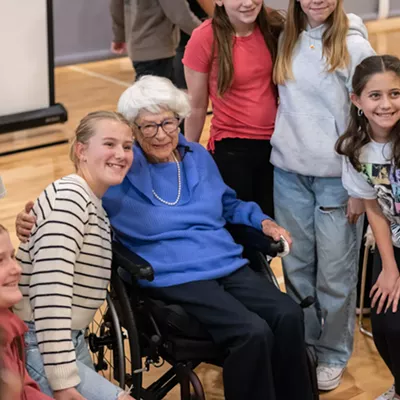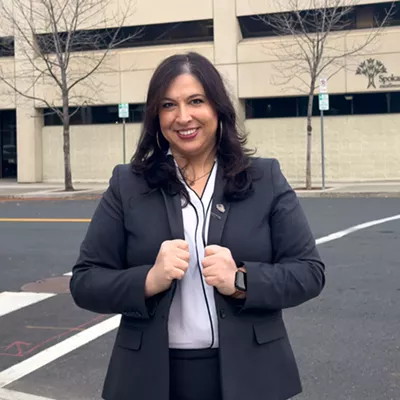
"Cool!"
"That's a big fat one!"
"You got the motherload!"
"Let me see!"
More than 20 fifth graders are circling the small pond at Lincoln Park in the Lincoln Heights neighborhood in Spokane. They stop every time they see colorful twine dangling from a tree branch into the water.
Wesley Pitter, their science teacher, calls on a star science student to pull on the twine and reel in a large mesh fish trap from under the surface.
The kids huddle around their classmate, who tries to hold the trap high enough for everyone to see. There are six traps total. Each trap, without fail, has goldfish in it.
"How did those fish get there?" parent volunteer Lisa Bowman asks the students.
The answer, the students know, is humans.
Bowman and Pitter are working with the Washington Department of Fish and Wildlife to spread the word about the invasive nature of goldfish, and they're starting with elementary students.
Throughout the last week in May, Bowman and Pitter have taken third, fourth and fifth graders from Franklin Elementary School to the nearby park to catch invasive goldfish and explore how humans can impact their environment, both for better and for worse.
Goldfish are nonnative fish that only make it into ponds and waterways by people releasing them there. Pet owners probably dump them with the best of intentions, Bowman says, not wanting to kill their fish but also not thinking about the damage the animals will cause outside an aquarium.
It only takes one person releasing a few goldfish to create a nearly unsolvable problem, says Randall Osborne, a district fish biologist with the state Department of Fish and Wildlife. Female goldfish can lay up to 10,000 eggs in their relatively short life, which means populations get out of control very quickly.
Plus, goldfish are voracious eaters and devour the bugs and plants that other juvenile fish would want to eat. With large appetites and eggs that hatch in just days once fertilized, they can crowd out other species very quickly.
The only way to completely eradicate goldfish from a body of water is to poison it with rotenone, Osborne says, which will kill all the fish (not just goldfish) and most other life in the water.
Nearby West Medical Lake has a major invasive goldfish problem, even after the fish were eradicated with rotenone in 2018. Goldfish were released into the lake again, and now the Department of Fish and Wildlife is proposing another rehabilitation this fall. It could cost up to $150,000.
The pond in Lincoln Park isn't at risk for rotenone treatment since it's small and there aren't many other species living in it. But the presence of goldfish in wild ponds shouldn't be normalized, Osborne says.
Even though these trapping field trips won't eradicate the goldfish in Lincoln Park completely, they will hopefully open the students' eyes to a problem that most adults don't know about, Pitter says. They'll also hopefully prevent any of the students from releasing their own pet goldfish into a nearby pond in the future.
"I think what attracted us to this project is that it's complex. There's no easy solution," Pitter says. "We wanted [the students] to really be able to see their place in the problem and the solution."
Many people in the South Hill neighborhood have no idea that goldfish are eating up their local pond. But Gabriel Gossel knew, even before his class field trip.
"I go up here a lot in the summer because I live close, and I've seen Fish and Wildlife take them out before," says the fifth grader, whose curly brown hair is tucked under a baseball cap.
He lingers in the back while other students dump the fish from each trap onto the ground in spots marked by red, yellow, and purple hula hoops. They need to count how many fish they caught and report the numbers to Fish and Wildlife. One trap has one, another has 11, while a few heftier traps have more than 30 fish each. The traps have only been set for two hours, but they've already caught close to 100 fish.
Students scoop them up by their tails, with the occasional scream or giggle because of an especially squirmy or slimy fish.
"This is the part I don't like," Gossel says. "I would either find a way to just end it quickly for them or I would not do it at all. Because I know they're invasive, but it's not their fault they're in there."
Once the fish are counted, they're put into ziplock bags and then a cooler, where they'll freeze and die. It's the most humane way to end the fish's life, Osborne says. The fish will then be turned into compost to be spread in vegetable and flower beds by the school's gardening club, Bowman says.
Before the students walk back to Franklin, they stop at another spot in Lincoln Park, a makeshift memorial that's recently been built with rocks and planted with flowers that seem to be nonnative. It's a beautiful sentiment, Bowman says, but it has the potential to disrupt the ecosystem just like goldfish do.
"This right here is a human intervention into nature," she says to a mostly attentive group. "This is how it can happen with the best of intentions — like you didn't want to kill that little goldfish, so you decided to release it in the pond. Or you wanted to make a beautiful piece of art, so you planted some flowers. But then it can have unintended consequences.
"One of you might become a future botanist or a conservationist — someone who works to partner with our land to make sure that, as humans, we're the caretakers of it," Bowman concludes. "I hope that you can remember this, to understand that as you leave Franklin, you are no longer just learning, you also have responsibilities to actually care for the land around you." ♦























